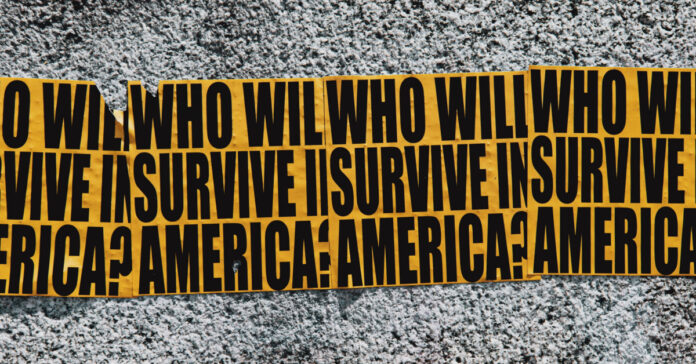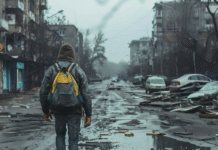We can all survive moderate food shortages and an energy crisis with proper preparation. Moderate inflation is also survivable, as we saw in the 1970s and early 1980s, and we’ve all experienced recessions. Hyperinflation, however, could lead to a financial collapse, not just of the U.S., but of the entire global economic system, which could lead to a far greater crisis. That would indeed be a dangerous time where being prepared would help, but is no guarantee.
Let’s examine one potential outcome of hyperinflation:
A Worst Case Scenario
After the virus, shortages and a moderate energy crisis, the United States suffers from massive hyperinflation. This leads to the collapse of the U.S. dollar as the government pays off its debts with dollars that are worth less than a thousandth of their value just a year before. As a result, international trading partners no longer trust the U.S. dollar. No one still values the “full faith and credit” of the government that backs the dollar. The economic collapse is upon us.
The U.S. may be the first domino to fall, but there is a long line of other economies that collapse right behind it, including China and many other Asian countries that count on selling goods to the U.S. Suddenly, much of the money in their bank accounts is worthless and their biggest trading partner is bankrupt, leaving them holding the bag.
International commerce grinds to a halt because the SWIFT international payment system breaks down along with the demise of the dollar. Manufacturers stop making goods because they cannot source raw materials. Ships make their final deliveries and then bob about on the sea, empty because there is nothing to export and little global commerce. Store shelves emptied as fast as they are delivered. Truck drivers drop their trailers and head home, assuming they have enough fuel to do so. People stop working because no one paid them. This makes the food shortage and the energy crisis worse, and that’s the least of our problems.
Chaos Reigns
Maybe this collapse happens slowly, over a period of years or months, or maybe it happens quickly, but once we reach this point, the world dissolves into chaos and anarchy as the food shortages and energy crisis we discussed in Part Two and Part Three suddenly seem like the good old days. Stores are looted, city blocks are burned, and not just in the U.S., but in more than half the countries around the globe. Dead bodies litter the street, and there is no longer a police, fire, or EMS response. The billionaires and their armed guards have bugged out to their secret ranches in Wyoming or to their houses in New Zealand.
Russia takes advantage of the chaos to invade the Ukraine and shows no signs of slowing down at their borders. China invades Taiwan and Japan fears it may be next. Israel launches a pre-emptive all-out attack on Iran. Suddenly, it looks like World War III is underway. What little remaining international commerce there was grinds to a halt in the face of these conflicts as the seas are no longer safe and distrust is at a record high. Russia shuts down gas pipelines to Europe. Oil, iron ore, steel, coal, corn, wheat, soybeans, and other goods no longer leave their home ports, sewing even greater disruption to the economy and causing wide spread starvation and death, especially when winter arrives.
The elites who started this realize things got out of hand, but it is too late to stop. They wanted a Great Reset which would give them more power, but they failed to realize a large enough reset would destroy them as well. They are targets now, and the peasants are at the door waving pitch forks and torches, calling for their heads.
Are You Prepared?
This is the type of conflict for which serious prepper should be preparing: A large global upset in which everything we count on in our daily lives is wiped away and we have to survive on only that which we have at hand plus some resources that are within a ten-mile radius. Imagine no more gasoline at the pumps, no more food on the shelves. Walmart, target and the dollar stores are stripped. Hardware stores are empty and abandoned. Some short-sighted people loot big-screen TVs and cell phones, only to realize their mistake a few days later when wireless services, the Internet and final electrical power go out.
You are on your own. Did you have time to bug out? Do you have enough gas to get there? Did you have time to make those last-minute purchases that were on your list? How do you feel about your preps? Because this is the time that the rubber hits the road.
The key is to survive for a few years. Not decades, not the rest of your life, just three years or so.
The Recovery
While the collapse of the U.S. dollar may have caused the problem, we outlined in this scenario, the U.S. will be in far better shape than many other developed nations. We have more natural resources and a far lower population density than most countries, giving individuals outside urban areas a higher chance of survival and recovery. We also have vast areas of arable lands.
Here are some important facts I considered in predicting America would recover more quickly than many other countries:
Food
In most years, the U.S. is a net exporter of food. It should be easy for America to grow enough food post-collapse for its much-reduced population. The challenge would be harvesting and getting it to market, meaning people who need it, and having a mechanism of exchange (money). We will have to live on locally grown food for some time. That means no coffee, chocolate or out-of-season foods, but in the long run, the absence of large corporate farms might be a good thing.
China depends on imported food to feed its population. Besides buying grain and soybeans from the U.S., it relies on imports from Brazil, Australia, New Zealand, and other countries. China would collapse and hundreds of millions would die without food imports.
Argentina, Australia, Brazil, Canada, New Zealand, Thailand and the U.S. account for about 55 percent of food exports. In addition to China, Korea Japan, Russia, and Saudi Arabia are big importers, followed my many countries in Europe, including the UK, Germany, Italy, Portugal, Sweden, and Finland, although some may be able to produce sufficient food given the large die off of their population.
Energy
America has been oil and energy independent and we could be so again. Without government regulations and prohibitions on burning coal and drilling for oil and gas in certain areas, the energy industry could get back up and running, at least on a local level. It might take some doing to spread nationally, but innovative people could get things up and running again, creating pockets of prosperity around hydropower dams and large solar power installations as well as in oil country.
Most of the world, including Europe, Asia and China, are not and can never be energy independent. They lack the oil reserves and sufficient mines. China may be able to produce enough coal for a greatly diminished population, but not enough oil and gas.
Armaments
For better or worse, the U.S. has more guns and ammunition in private hands than any other country. In the above scenario, I consider this to be a good thing because it allows small groups of united individuals to kill marauders. In a country where only criminals have guns, it would be difficult for preppers to avoid being overtaken and pillaged by armed gangs. Preppers in the U.S. can be on at least an even footing. Given the number of former military personnel among the community, I expect preppers might even have an advantage, assuming that they can work collectively instead of everyone wanting to lone wolf it.
The unanswered question is what role, if any, the military will play? Will they become the local power, using their equipment to roll over preppers and confiscate their food and supplies? Or will they join forces with them? Perhaps they will focus on protecting the country from foreign invaders or protecting the remnants of the political elite? Maybe members will steal their personal weapon and other gear and head home? No one knows, but at some point you need fuel to run the equipment of war and those storage tanks will run dry.
The Final Outcome
While it is important to prep for short-term emergencies, localized disruptions, and temporary upsets, I think it behooves every serious prepper to be prepared for a lengthy disruption.
While I predict things will stabilize after a few years and some sense of civilization might return, there is no guarantee that will be the case.
Even if you and I live through the worst the world throws at us, we may never reach the heights we enjoy today. We may never have instant global communication, easy access to any product you can imagine, and imported foods. After the recovery, an orange might be a delicacy. Coffee might be worth more than gold. On the other side of the equation, however, we might have more freedom, less anxiety, and be a stronger, more united country.







